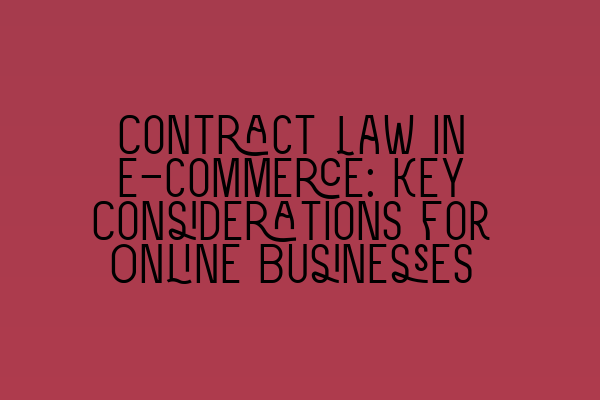Contract Law in E-commerce: Key Considerations for Online Businesses
In today’s digital age, e-commerce has become a vital component of the business world. With the increasing popularity of online shopping, it is essential for online businesses to understand and navigate the intricacies of contract law. Contracts provide a legal framework for transactions, ensuring that rights and obligations are clearly defined for both parties involved. In this blog post, we will explore the key considerations that online businesses need to keep in mind when it comes to contract law.
1. Offer and Acceptance
One of the fundamental principles of contract law is the formation of a valid contract through offer and acceptance. In the e-commerce context, the offer is typically made when a customer adds items to their online shopping cart and proceeds to checkout. The acceptance occurs when the customer clicks the “Place Order” or similar button to confirm the purchase. It is crucial for online businesses to have clear and unambiguous offer and acceptance mechanisms in place to ensure that a valid contract is formed.
2. Terms and Conditions
Terms and conditions serve as the governing rules for the contractual relationship between the online business and its customers. They outline the rights and responsibilities of both parties and provide clarity on issues such as payment terms, delivery and returns, intellectual property rights, and dispute resolution. It is essential for online businesses to have well-drafted and easily accessible terms and conditions, which customers are required to accept before proceeding with a purchase. Not only do clear terms and conditions protect the business, but they also ensure that customers are aware of their rights and obligations.
3. Electronic Signatures
In traditional contract law, signatures are often required to validate a contract. However, in the digital world, electronic signatures have gained acceptance as a valid form of signing contracts. Online businesses must ensure that their electronic signature procedures comply with applicable legal requirements. This may include obtaining explicit consent from customers to use electronic signatures, keeping records of electronic transactions, and implementing strong security measures to prevent fraud or unauthorized access.
4. Consumer Protection Laws
When dealing with consumers in e-commerce, online businesses must be aware of and comply with consumer protection laws. These laws exist to safeguard the rights and interests of consumers and often include provisions related to unfair contract terms, product liability, and consumer guarantees. Online businesses must ensure that their contracts and business practices do not infringe upon these consumer protection laws, as non-compliance can result in legal consequences and damage to reputation.
5. Privacy and Data Protection
With the increasing emphasis on data protection and privacy, online businesses must consider these aspects when drafting their contracts. It is essential to have clear provisions regarding the collection, use, storage, and sharing of personal data. Online businesses must also comply with relevant data protection laws, such as the General Data Protection Regulation (GDPR) in the European Union. Failing to adequately address privacy and data protection can lead to legal liabilities and reputational harm.
Conclusion
As e-commerce continues to grow, it becomes imperative for online businesses to understand and navigate the complexities of contract law. By considering the key considerations outlined in this blog post, online businesses can ensure that their contractual relationships are legally sound, protect their interests, and maintain customer trust. Remember to have clear offer and acceptance mechanisms, well-drafted terms and conditions, secure electronic signature procedures, compliance with consumer protection laws, and robust privacy and data protection provisions in your contracts. By doing so, you can pave the way for successful and legally compliant e-commerce operations.
Related Articles:
– SQE 1 Practice Exam Questions
– SQE 1 Practice Mocks FLK1 FLK2
– SQE 2 Preparation Courses
– SQE 1 Preparation Courses
– SRA SQE Exam Dates
